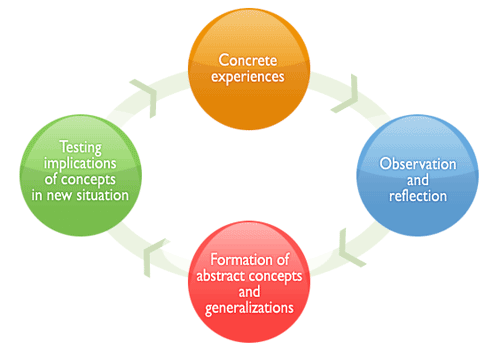 |
| |

|
 |
| The TESOL Certificate is designed using a model in which learning comes directly from experience. In this experiential learning model, learning is seen as a rich “process whereby knowledge is created through the transformation of experience” (Kolb: 1974: 38). The role of the learners is central to making learning happen and the trainers’ role is both to structure activities to follow the cycle of experiential learning and to guide participants in optimizing their learning at each stage. |
 |
| The experiential learning cycle in the course most often begins with a concrete experience that all participants take part in together. For example, on the second day of the course the participants experience a series of lessons in a foreign language. This is followed by the second stage of the cycle: Observation and reflection. During this stage, participants are asked to look back at the language learning experience and describe what happened as they work towards an understanding of what helps and hinders language learning. Trainers guide participants in developing their skills in recalling key details. Next, participants are asked to draw on their descriptions to make generalizations about the teaching/learning process. Again, the trainers’ role is to guide participants in analyzing and synthesizing their experiences in order to understand the language teaching/learning process at a level that will transfer to subsequent experiences. From here, participants are asked to look forward, to generate ways that they can apply their experience and knowledge, and to test their ideas in future actions. One simplification of this model is built around three questions. |

|
 |
 |
| Throughout the course, participants are asked to examine their own motivations, beliefs and assumptions and how these inform the decisions they make when teaching. These conclusions about their own teaching practice are then challenged and/or validated in light of the learning of their students. Reflection is expected in all aspects of the course, but particularly in relation to participants own teaching. Reflection on teaching follows the experiential learning cycle (Experience, Describe, Analyze and Take Intelligent Action) and participants are guided in developing a rigorous and disciplined reflective practice. Once they are familiar with this cycle, participants have the ability to both pose and solve problems related to their teaching, empowering them to constantly improve upon and renew their practice. |
 |
 |
| The curriculum shows participants how to base their teaching on learner’s needs and motivations as well as on formalized curricula and materials. Learners and learning is seen as the focus of lessons as opposed to teachers and teaching. Participants are expected to develop a learner-centered approach in their teaching practice. |
 |
 |
| We believe that teaching follows learning. Hence, getting and responding to feedback from learners on a regular basis is essential to building a successful learning experience. Throughout the course the trainers seek feedback from participants in formal and informal ways. Participants are expected to develop the ability and habit of asking and responding to feedback from their students in the teaching practice. |
 |
 |
| Inductive learning refers to interactions in which a participant learns by finding the information on his/her own and drawing his/her own conclusions. The trainer's role is to facilitate or guide the process rather than to provide information or answers. (The course also introduces deductive methods of teaching, but the style of the trainers is expected to be predominantly inductive.) Participants are expected to experiment with inductive learning with their English students. |
 |
 |
| Participants need to meet the same concepts in different ways and at distinct times during the course so they can internalize the principles and apply them to their own practice: journaling, sharing, reading, hearing about, experiencing, creating a poster are examples of some of the ways concepts are presented and practiced throughout the course. Additionally, participants have the opportunity to work individually, in small groups and in the large group; with and without the trainer. |
 |
 |
Throughout the course, trainees and participants are regularly asked to work in groups when completing assignments, planning lessons, practice teaching, giving feedback, etc. We consider collaborative work and cooperative learning powerful tools which:
|
 enhance creative problem solving skills enhance creative problem solving skills
 aid in the understanding and retention of information and ideas aid in the understanding and retention of information and ideas
 foster positive social and communicative skills (necessary for training/teaching) foster positive social and communicative skills (necessary for training/teaching)
 encourage learners both to rely on their own skills and to see others as valuable resources encourage learners both to rely on their own skills and to see others as valuable resources
|
|
Trainers support and guide participants in the course in exploring learner-centered teaching practices. Collaborative work among students is one of the techniques that participants may use for a number of teaching purposes and in a number of contexts. By participating in group work during the course and consciously following the stages of the experiential learning cycle, participants are able to develop these skills that will help them work with others and help others work in groups. |
 |
